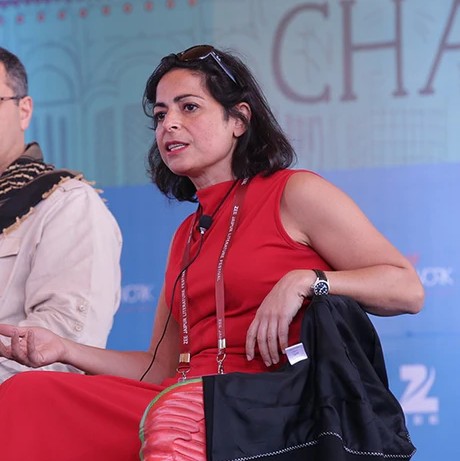Laleh Khalili: A Distinguished Scholar of Gulf Studies and Middle Eastern Politics

The world of academia is enriched by individuals whose research not only transforms scholarly discourse but also shapes wider public understanding of politics, history, and society. Laleh Khalili stands as one of these figures. With an academic journey that began in the sciences and culminated in a distinguished career in political science, Khalili has become an authoritative voice on Middle Eastern politics, Gulf Studies, logistics, and the politics of war and trade. Her trajectory through renowned institutions such as Columbia University, SOAS, Queen Mary University of London, and the University of Exeter has given her both an international perspective and a profound scholarly impact.
Academic Background
Early Education and Transition to Political Science
Although best known as a political scientist, Laleh Khalili began her academic path in a very different field. She earned her undergraduate degree in Chemical Engineering from the University of Texas in 1991. This scientific foundation gave her a rigorous analytical approach that would later prove invaluable in her research into politics, infrastructure, and systems of power.
Her intellectual curiosity led her to Columbia University, where she pursued a Master’s degree in International Affairs before completing her PhD in Political Science in 2004. This period at Columbia was formative, equipping her with theoretical depth and methodological sophistication that became hallmarks of her scholarship.
Academic Career
Lecturer at SOAS
After completing her doctorate, Laleh Khalili joined the School of Oriental and African Studies (SOAS), University of London. As a lecturer, she contributed to one of the world’s leading centres for the study of Asia, Africa, and the Middle East. Her teaching and research during this time began to establish her reputation as a sharp analyst of Middle Eastern politics, particularly in relation to conflict, nationalism, and social movements.
Queen Mary University of London
In September 2019, Khalili became a Professor of International Politics at Queen Mary University of London. Her tenure at Queen Mary solidified her standing as a leading scholar in critical international politics. She engaged deeply with issues of logistics, maritime trade, and the geopolitics of the Gulf region. Her teaching inspired countless students, while her published works extended her influence across global academic networks.
University of Exeter
In June 2023, Laleh Khalili was appointed Professor of Gulf Studies at the University of Exeter. Exeter’s Gulf Studies programme is internationally recognised for its focus on the Arabian Peninsula, and Khalili’s appointment marked a significant enhancement of the department’s intellectual strength. At Exeter, she continues to produce ground-breaking research while contributing to the education of a new generation of scholars and practitioners focused on the Gulf and Middle East.
Scholarly Contributions
Focus on the Middle East and the Gulf
The central theme of Khalili’s research has been the politics of the Middle East, with particular emphasis on the Arabian Peninsula and the wider Gulf region. She analyses the intersection of infrastructure, trade, capitalism, and state power, demonstrating how seemingly technical or logistical matters are in fact deeply political.
Incarceration, Counterinsurgency, and Conflict
One of her early major works, Time in the Shadows: Confinement in Counterinsurgencies (2012), investigated the politics of incarceration and detention in modern counterinsurgencies. Drawing parallels between different global conflicts, she illustrated how confinement has been used as a tool of control and domination. The book received widespread recognition for its originality and critical insight.
Commemoration and National Identity
Her first book, Heroes and Martyrs of Palestine: The Politics of National Commemoration (2007), delved into the ways in which societies construct national memory. By examining how Palestinian martyrs and heroes are remembered, Khalili shed light on the politics of identity, nationalism, and resistance.
Logistics, Shipping, and Capitalism
Perhaps her most significant contribution in recent years has been her work on shipping and global trade. Sinews of War and Trade: Shipping and Capitalism in the Arabian Peninsula (2020) examined how the Gulf has been shaped by maritime infrastructure, logistics, and global capitalism. This book brought together history, political economy, and sociology, offering an unprecedented look at how shipping lanes, oil tankers, and ports are central to both regional and global dynamics.
Her research extended into the corporeal lives of those who work at sea, exploring the lived realities of seafarers and the human side of the global logistics chain. This dimension of her work highlighted her commitment to uncovering the experiences of marginalised and often invisible groups.
Methodological and Theoretical Approach
Interdisciplinary Analysis
Laleh Khalili’s work is marked by its interdisciplinarity. Drawing from political science, history, sociology, geography, and even elements of anthropology, she bridges disciplines to provide holistic analyses of complex issues.
Emphasis on Power and Visibility
A recurring theme in her scholarship is the question of visibility: what is made visible and what is obscured in politics, war, and trade. From the commemoration of martyrs to the hidden labour of seafarers, she consistently interrogates how narratives are constructed and whose voices are marginalised.
Public Engagement and Influence
Writing Beyond Academia
In addition to her academic books and articles, Laleh Khalili is an active public intellectual. She has written essays and commentaries in widely read outlets such as the London Review of Books, where she connects her research to contemporary political and economic issues.
Contributions to Policy and Debate
Her insights into the Gulf, trade, and logistics have also made her a sought-after commentator on international affairs. Policymakers, journalists, and activists have drawn on her expertise to better understand the hidden infrastructures of global politics.
Legacy and Ongoing Work
Laleh Khalili’s impact lies not only in the originality of her research but also in her ability to bring together diverse audiences. She has shown that studying ports, shipping lanes, or commemorative practices can illuminate larger dynamics of capitalism, colonialism, and resistance.
At Exeter, she continues to develop her research on the political economy of the Gulf and the human dimensions of global logistics. Her work inspires both established academics and students entering the field, ensuring that her intellectual legacy will continue to grow.
Conclusion
Laleh Khalili is a scholar of immense influence whose career spans continents, disciplines, and themes. From her early work on Palestinian memory to her groundbreaking research on shipping and the Gulf, she has consistently challenged conventional understandings of politics and power. Today, as Professor of Gulf Studies at the University of Exeter, she stands as one of the most important voices in Middle Eastern and international political scholarship. Her commitment to rigorous research, public engagement, and amplifying marginalised perspectives makes her a figure of lasting significance in both academic and public debates.



